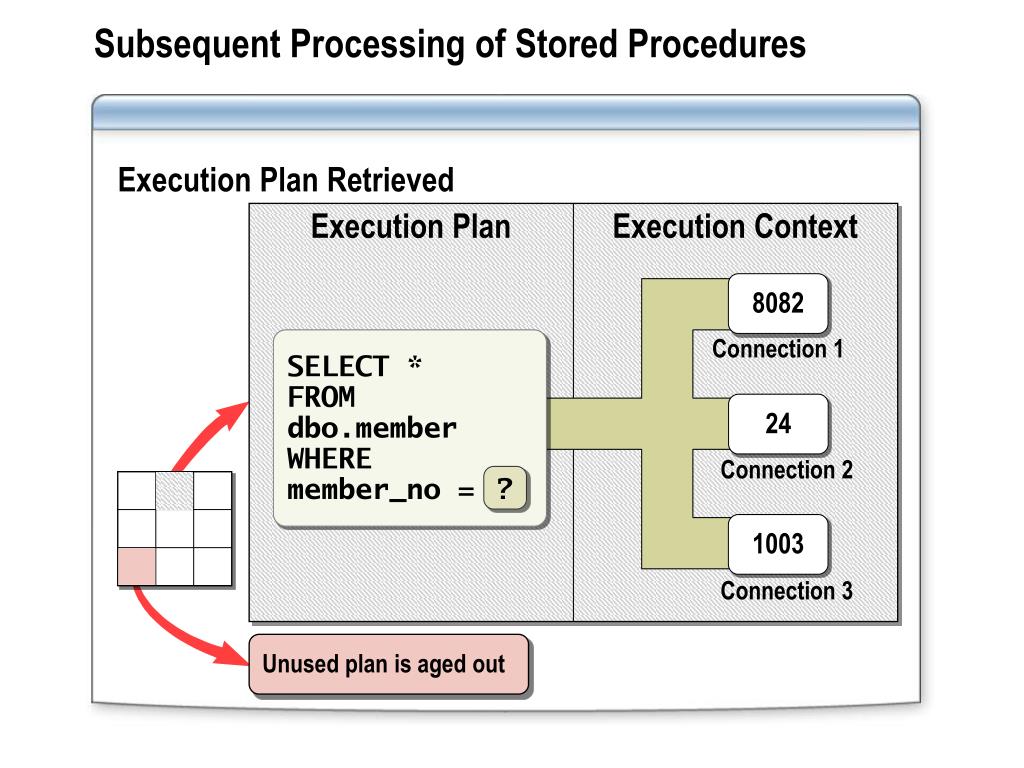
Alter query_emp by changing PLSQL_OPTIMIZE_LEVEL to 3. Query the system view USER_PLSQL_OBJECT_SETTINGS to check PLSQL_OPTIMIZE_LEVEL and PLSCOPE_SETTINGS for procedure query_emp. To avoid this process, specify the REUSE SETTINGS clause. DBCC FREEPROCCACHE clears the procedure cache and causes ad hoc queries to. The database ID number to be affected must be entered as part of the command. Use the ttIsql command SHOW ERRORS to display compilation errors.ĭuring recompilation, TimesTen drops all persistent compiler settings, retrieves them again from the session, and stores them at the end of compilation. DBCC FLUSHPROCINDB: Used to clear out the stored procedure cache for a specific database on a SQL Server, not the entire SQL Server.

If recompiling the procedure results in compilation errors, then TimesTen returns an error and the procedure remains invalid. If TimesTen recompiles the procedure successfully, then the procedure becomes valid. TimesTen also invalidates any objects that depend on the procedure, such as procedures that call the recompiled procedure or package bodies that define procedures that call the recompiled procedure. Use of Recompile makes SQL Server to recompile to SP, hence instead of using existing plan for same SP, Database engine will create new execution plan. TimesTen first recompiles objects upon which the procedure depends, if any of those objects are invalid. There are a few ways to ensure recompilation of a stored procedure: using WITH RECOMPILE, making the stored procedure dynamic (think exec()) marking the. To redeclare or redefine a procedure, use the CREATE PROCEDURE statement. The ALTER PROCEDURE statement does not change the declaration or definition of an existing procedure. When you specify REUSE SETTINGS, TimesTen preserves the existing settings and uses them for the compilation of any parameters for which values are not specified. Use this optional clause to prevent TimesTen from dropping and reacquiring compiler switch settings. If you omit a parameter and either you do not specify REUSE SETTINGS or no value has been specified for the parameter in an earlier compilation, then TimesTen obtains the value for the parameter from the session environment. If you omit a parameter from this clause and you specify REUSE SETTINGS, then if a value was specified for the parameter in an earlier compilation, TimesTen uses that earlier value.

You can specify each parameter once in the statement. Now again creating that stored procedure with RECOMPILE option. The PL/SQL persistent compiler parameters are PLSQL_OPTIMIZE_LEVEL, PLSCOPE_SETTINGS and NLS_LENGTH_SEMANTICS. Use this optional clause to specify a value for one of the PL/SQL persistent compiler parameters. The way I find them is: SELECT OBJECTNAME(ID)AS SPNAME, FROM SYSCOMMENTS WHERE TEXT LIKE WITH RECOMPILE when I look at: select from sys.procedures I find no indication of recompiles. If the procedure does not compile successfully, use the ttIsql command SHOW ERRORS to display the compiler error messages. To recompile a stored procedure by using the WITH RECOMPILE option. In my databases I have some Stored procedure with recompile. Required keyword that causes recompilation of the procedure.


 0 kommentar(er)
0 kommentar(er)
